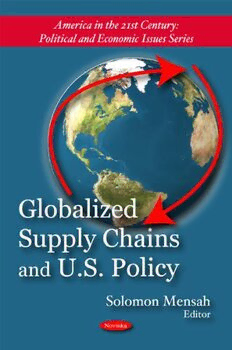
Globalized Supply Chains and U.S. Policy PDF
100 Pages·2010·1.289 MB·English
Most books are stored in the elastic cloud where traffic is expensive. For this reason, we have a limit on daily download.
Preview Globalized Supply Chains and U.S. Policy
Description:
In the globalised world of business, production is becoming fragmented into discrete activities and can be spread geographically within and across national borders while remaining integrated organisationally within a multinational company or network of companies. Such globalised production networks are called supply chains or value-added networks. This world of supply chains raises both challenges and opportunities for U.S. policymakers, firms, and workers. The globalisation of production networks has raised policy issues and has called into question certain long-held perceptions about the efficacy and effects of policy initiatives. Traditional trade and investment policy is based on national governments, national economies, and country-to-country relations, but much of trade today is between related companies spread across the globe. In international trade, traditional policies aimed at reducing border barriers still tend to increase economic efficiency, but global supply chains may affect the incidence or impact of the policies. This book describes the relationship between globalised supply chains and U.S. policies. This book consists of public documents which have been located, gathered, combined, reformatted, and enhanced with a subject index, selectively edited and bound to provide easy access.
See more
The list of books you might like
Most books are stored in the elastic cloud where traffic is expensive. For this reason, we have a limit on daily download.
